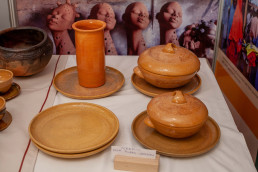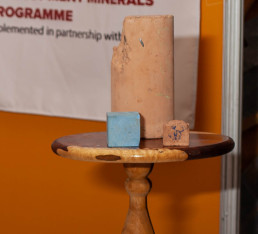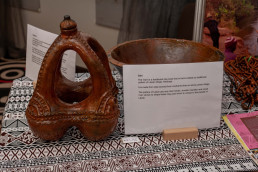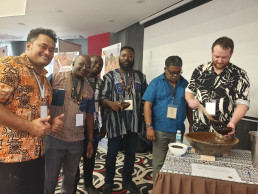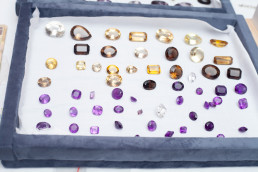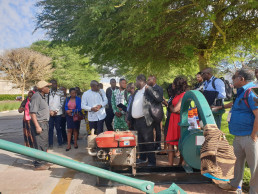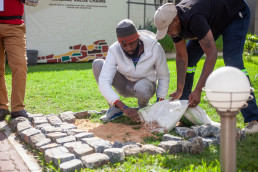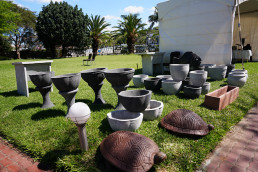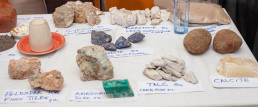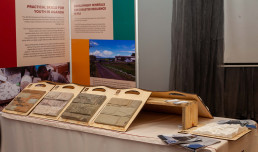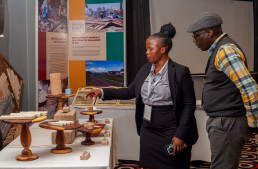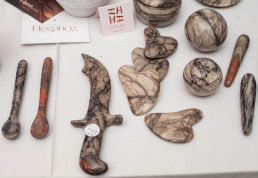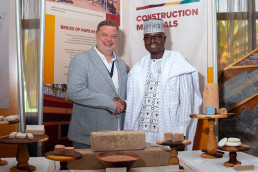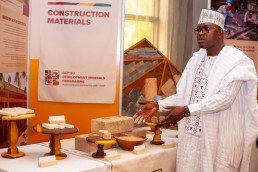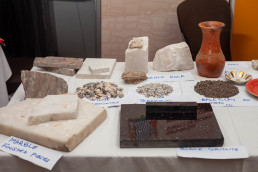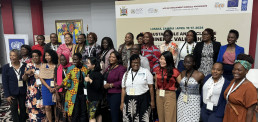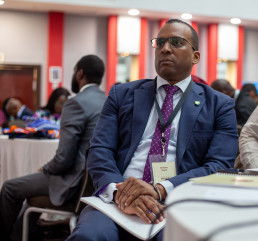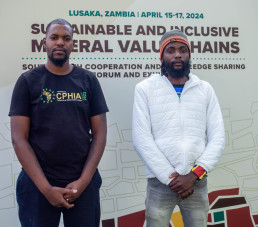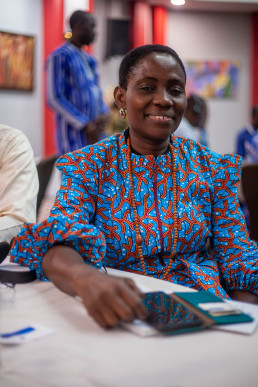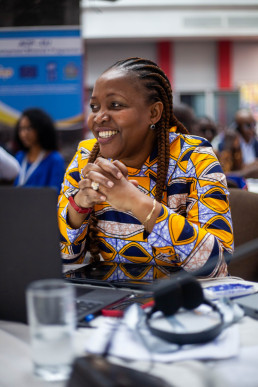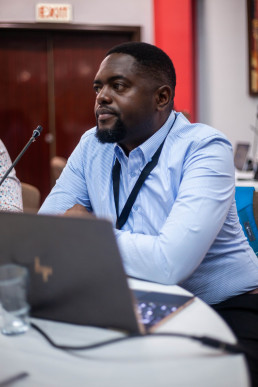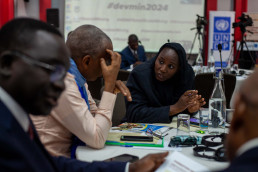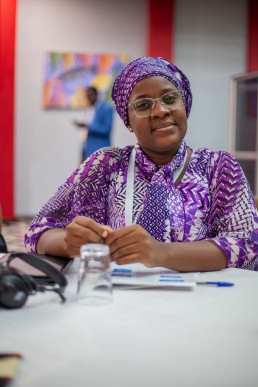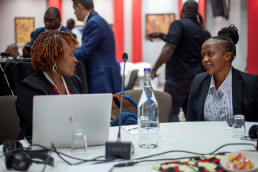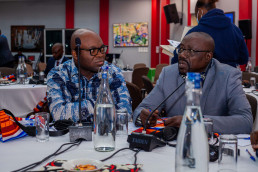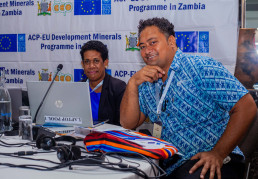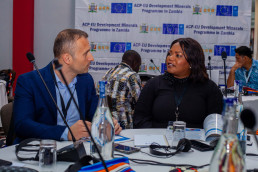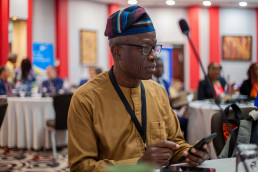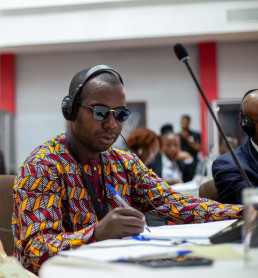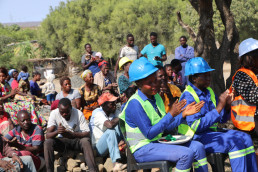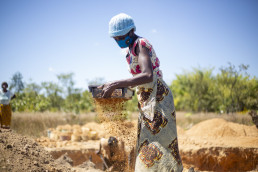Exhibition of Development Minerals

Alongside the Forum on Sustainable and Inclusive Mineral Value Chains, South-South Cooperation and Knowledge Sharing, the ACP-EU Development Minerals Programme organized an exhibition on Development Minerals.
The exhibition showcased products made from Development Minerals by ASM enterprises from several African, Caribbean and Pacific countries, demonstrating the impact of the ACP-EU Development Minerals Programme in promoting economic empowerment and job creation.
Forum on Sustainable and Inclusive Mineral Value Chains, South-South Cooperation and Knowledge Sharing
Lusaka, Zambia
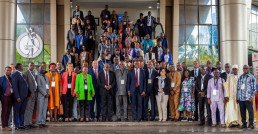
The international Forum on Sustainable and Inclusive Mineral Value Chains addressed the importance of enhancing artisanal and small-scale mining (ASM) practices, specifically focusing on Development Minerals which support livelihoods in numerous countries. Organized by the ACP-EU Development Minerals Programme, implemented by the United Nations Development Programme, and hosted by the Government of Zambia, the forum brought together over 140 participants from 30 countries.
The forum enabled knowledge exchange among various stakeholders, including government representatives, UNDP country office representatives, environmental agencies, ASM associations, mining enterprises, chambers of mines, international organizations, NGOs, academic institutions, and private sector entities. Key topics included sustainable ASM practices, governance tools, ASM and large-scale mining linkages, value-addition innovations, digital market integration, mineral information management, and the role of critical minerals in clean energy transition.
The outcomes of the forum included knowledge sharing, innovation exchange, policy advocacy, and networking to foster collaboration and advance sustainable and inclusive mineral value chains.
ASM Cooperative Receives Made-in-Zambia Stone Crusher
Livingstone
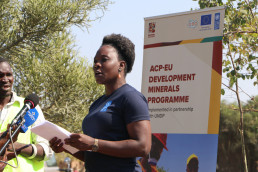
To support value-addition and manufacturing in the sector, the Programme together with UNDP Zambia (Accelerator Lab), supported innovators in the ASM sector.
The Programme provided a small grant to a small-scale enterprise that makes equipment for artisanal miners. The small business run by Victor Pikiti with his son in Kabwe, Zambia, was selected among a dozen entries.
Initially started with manufacturing of agricultural equipment, Mr. Pikiti was inspired to produce equipment for small miners after he has seen the hardship and physical toil of women miners crushing stone. A stone crusher that was produced with this grant was donated to Chibelenga Manual Stone Crushers Cooperative, a women miners’ cooperative in Livingstone.
The initiative helps support domestic production of equipment, while at the same time benefitting artisanal women miners, improving their productivity and incomes. Sustainable business models to promote manufacturing of such equipment in Zambia and its adoption to improve productivity and occupational health of women who previously only used manual tools will be further explored for scaled-up adoption.
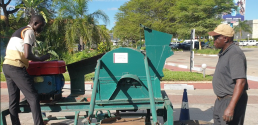
Copperbelt Agriculture, Mining, Industrial and Networking Enterprise (CAMINEX)
Copperbelt, Kitwe
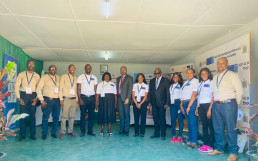
The Copperbelt Agricultural, Mining, Industrial and Networking Enterprise Committee organized and hosted the 2024 edition of the Copperbelt Agricultural, Mining, Industrial and Networking Enterprise (CAMINEX) in May 2024, under the theme “Unlocking Opportunities for Growth: Zambia’s Land linked Position.” The ACP-EU Development Minerals Programme, in partnership with the Ministry of Mines and Minerals Development, participated to highlight and showcase implemented activities and the roadmap for future activities in the Programme. CAMINEX served as a platform to facilitate networking among ASMEs involved in the programme, resulting in increased business linkages.
Op-ed: Transforming Artisanal Mining Can Be Beneficial for People and the Planet
Artisanal and Small-scale Miners (ASM) are the “orphans” of the mining world. The global mining industry, including some governments, perceives artisanal mining as a “residual sector.” Yet over 40 million artisanal miners toil in mines around the world and contribute to local economies. Their labour helps respond to the growing demand for minerals used in everything from smartphones to solar panels and batteries and from roads and buildings.
Eight or nine out of ten people who work in mining are either artisanal or small-scale miners. In many developing countries around the world, particularly in Africa, artisanal mining is the second or third largest employer after agriculture and retail trade. It is estimated that artisanal miners bring home higher incomes compared with subsistence farmers.
Artisanal and small-scale miners play a big role in the mining of Development Minerals such as construction materials, industrial minerals and semi-precious stones – to meet the growing needs of construction and infrastructure. In many African, Caribbean and Pacific countries, they produce upwards of 60 per cent of construction materials. In Uganda, for example, artisanal miners produce over 80 per cent of Development Minerals. So surely this cannot be treated as a “residual sector”.
Increasingly, artisanal miners are mining so-called “critical minerals.” Their contribution is significant as the world grapples with insufficient exploration and critical mineral shortages. For instance, in Zambia, they are mining cobalt, tungsten, tin, tantalum and copper. Relying on local wisdom, artisanal miners are often the “native geologists” because of their intimate knowledge of the land, and they are often the first to discover valuable minerals.
However, artisanal miners around the world are often exploited and work in unregulated mines in unsafe conditions and are disproportionately exposed to high risks of accidents, health hazards, and diseases. Additionally, negative environmental impacts from mining, resulting in deforestation, loss of biodiversity, pollution, disruption of water bodies, and land degradation, severely harm neighbouring communities.
As the quest for critical minerals required for developing clean energy and infrastructure grows exponentially, the future of mining must integrate artisanal and small-scale mining. There needs to be a commitment to improving lives and protecting the environment.
It is time for a paradigm shift. One where artisanal miners are treated fairly and deliberate actions safeguard the environment are put in place. This shift calls for political goodwill, legal and policy frameworks that elevate the status of artisanal and small-scale miners from marginalised entities to valued industry participants. Countries must adopt strategies to manage artisanal and small-scale mining effectively and sustainably to make tangible improvements in their lives.
Firstly, governments should institute and adequately fund the administration of artisanal miners who are seriously neglected and under-resourced. This would equip mining authorities with tools and capacities to conduct inspections of artisanal mining operations, facilitate their legalisation, and provide technical services to enhance and manage health, safety, and the environment.
For mineral-rich countries, allocating a fraction of fiscal revenues from large-scale mining to fund artisanal and small-scale mining administration would be a good start. The booming demand for critical minerals presents a compelling reason and unique opportunity to reinvest in the sector responsible for employing most of the world’s miners.
Secondly, artisanal and small-scale mining are vastly underfunded or neglected. Countries should increase productivity growth and incomes of artisanal miners by improving access to affordable financing and equipment that can improve efficiency. With better access to finance and investment in technology, the livelihoods of many miners will improve. It will address multiple social and human rights problems plaguing artisanal mining such as children working in mines or gender-based violence fuelled by poverty. Today’s artisanal miners can grow into the medium-scale mining companies of tomorrow, with responsible business practices.
Thirdly, countries should encourage artisanal miners to move into other decent jobs and diversified activities. If the productivity of artisanal miners increases, this will free them up to work in other parts of mineral value chains – in manufacturing or construction. This possibility is within reach of artisanal and small-scale businesses using Development Minerals. They can graduate from mining to manufacturing of building materials and many other products – the demand for which is burgeoning in many African, Caribbean and Pacific countries. This transition can be the basis for industrialisation, infrastructure building, housing construction and employment generation in growing markets.
Fourthly, countries should intentionally protect environmentally valuable and sensitive areas. For example, mining and quarrying in rivers is rampant in many countries, leading to irreversible ecosystem changes and undermining the very livelihoods that the artisanal miners strive to improve. Thus, countries should safeguard such sensitive areas and tighten the implementation of environmental protection laws and regulations where necessary.
These changes can shift the model of present-day mining with a handful of large international companies on the one hand, and millions of subsistence miners on the other hand. The rise of the “missing middle” in mining can transform the reputation of the mining sector to one that contributes to shared prosperity and lifts millions out of poverty.
It’s time for a future where artisanal miners are seen not as a “residual”, but as valued partners in the mining industry. Let us rewrite the narrative around mining, one that recognizes the ingenuity and hard work of men and women in artisanal mines by empowering them. This will make the future of mining an inclusive pathway for sustainable development for countries that provide minerals to the world.
James Wakiaga is the UNDP Resident Representative in Zambia, and Uyanga Gankhuyag is the Programme Manager of African, Caribbean and Pacific States – EU Development Minerals Programme, UNDP.

